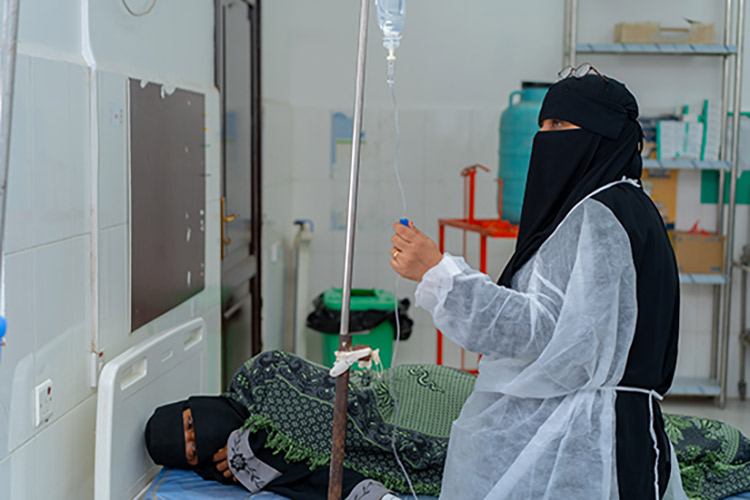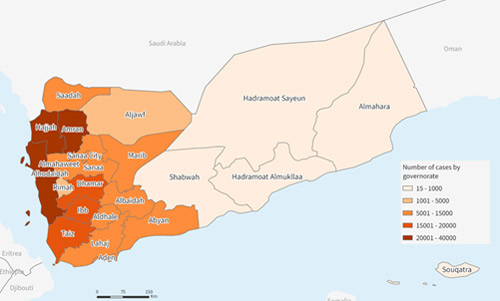 23 December 2024, Aden, Yemen – Yemen bears the highest burden of cholera globally. The country has experienced persistent cholera transmission for many years, including the largest outbreak – between 2017 and 2020 – recorded in recent history.
23 December 2024, Aden, Yemen – Yemen bears the highest burden of cholera globally. The country has experienced persistent cholera transmission for many years, including the largest outbreak – between 2017 and 2020 – recorded in recent history.
As of 1 December, Yemen had reported 249 900 suspected cases of cholera, with 861 associated deaths since the beginning of the year. This accounts for 35% of the global cholera burden and 18% of global reported mortality. The number of cases and deaths reported in November 2024 are 37% and 27% higher than the same month in 2023. The increase this year is largely due to updated data from Yemen, with adjustments made to account for more detailed information from all governorates.
Geographic distribution of cholera cases in Yemen
 Source: The Ministry of Public Health and Population and the Ministry of Health and Environment in Yemen, as of 24 November 2024.
Source: The Ministry of Public Health and Population and the Ministry of Health and Environment in Yemen, as of 24 November 2024.
Disclaimer: the boundaries and names shown and the designations used on this map do not imply the expression of any opinion whatsoever on the part of the World Health Organization concerning the legal status of any country, territory, city or area or of its authorities, or concerning the delimitation of its frontiers or boundaries.
"The outbreak of waterborne diseases like cholera and acute watery diarrhoea imposes an additional burden on an already stressed health system facing multiple disease outbreaks. WHO and humanitarian actors are strained in their efforts to address the increasing needs due to severe funding shortages,” said WHO Representative and Head of Mission in Yemen Dr Arturo Pesigan.
“Lack of access to safe drinking water, poor community hygiene practices and limited access to timely treatment further hinder efforts to prevent and control the disease."
Addressing cholera in Yemen requires urgent and comprehensive interventions, covering coordination, surveillance, laboratory capacity, case management, community engagement initiatives, water, sanitation and hygiene (WASH) and oral cholera vaccinations. Timely and sufficient funding is necessary for these interventions. In addition, damaged public water and sanitation infrastructures require intensive rehabilitation to prevent a recurrence of the devastating scenario the country experienced between 2017 and 2020.
Based on projected incidence carried out in September for the response period between October 2024 and March 2025, the cholera response in Yemen faces a funding gap of US$ 20 million. Between March and the end of November 2024, 47 diarrhoea treatment centres (DTCs) and 234 oral rehydration centres (ORCs) were closed due to lack of funding. Another 17 DTCs and 39 ORCs are set to be closed by the end of 2024 – that is, 84% of DTCs and 62% of ORCs – if additional funding is not provided to health partners.
Since the emergence of the latest cholera outbreak in March 2024, WHO has worked closely with the Ministry of Public Health and Population and the Ministry of Health and Environment through the UN multisectoral response plan to manage the outbreak. WHO supported more than 25 000 rapid response team missions to investigate alerts and initiate control measures at the local level; provided laboratory reagents and supplies to support the confirmation of infections in 12 central public health laboratories; procured and distributed essential medicines, medical supplies, WASH and infection prevention and control supplies to health facilities, including the 18 DTCs receiving WHO support; trained over 800 health workers on case management, and supported the Ministry of Public Health and Population with an oral cholera vaccination campaign providing protection for 3.2 million people in 34 districts of 6 governorates in Yemen.
Media contacts
WHO Yemen Communications
Email:
About WHO
Since 1948, the World Health Organization (WHO) has been the United Nations agency dedicated to advancing health for all, so that everyone, everywhere can attain the highest level of health. WHO leads global efforts to expand universal health coverage, direct and coordinate the world’s responses to health emergencies and connect nations, partners and people to promote health, keep the world safe and serve the vulnerable.


